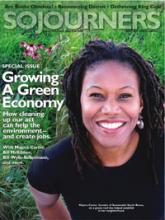In the four weeks that precede Pentecost, John walks us through the basics of Christian community. With metaphors of sheep and shepherd, vine and branches, he insists that the beloved community is defined by its ability to practice in its communities what it preaches to the world. We can hardly become legitimate bearers of God’s love to the world if we do not share it with one another. Preaching justice and equality to the world when our own institutions express the opposite makes our words hollow and our actions empty.
The love about which Jesus and John speak so emphatically is not sentimental and never condescending. It is love expressed among equals and therefore demands relationships and community structures that honor this truth. Our communities must also make manifest God’s new reign as lived by Jesus: extended to all, regardless of the labels the world has imposed—outcast, enemy, unclean, ungodly.
But because discipleship is an ongoing process, and because human institutions are by definition flawed, in the fifth week we celebrate the gift of the one who will “renew the face of the ground” (Psalm 104:30) and “guide you into all the truth” (John 16:13). The gift of the Spirit, a demonstration of God’s continuing optimism about and fidelity to humanity, is only the most recent manifestation of God’s desire to relate to us.
Michaela Bruzzese, a Sojourners contributing writer, lives in Brooklyn, New York.
May 3
Practicing Good News
Acts 4:5-12; Psalm 23; 1 John 3:16-24; John 10:11-18
Read the Full Article
